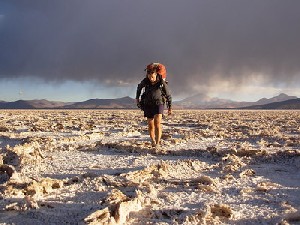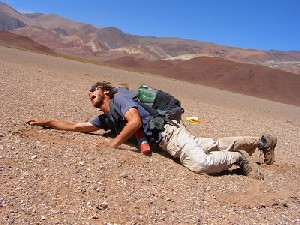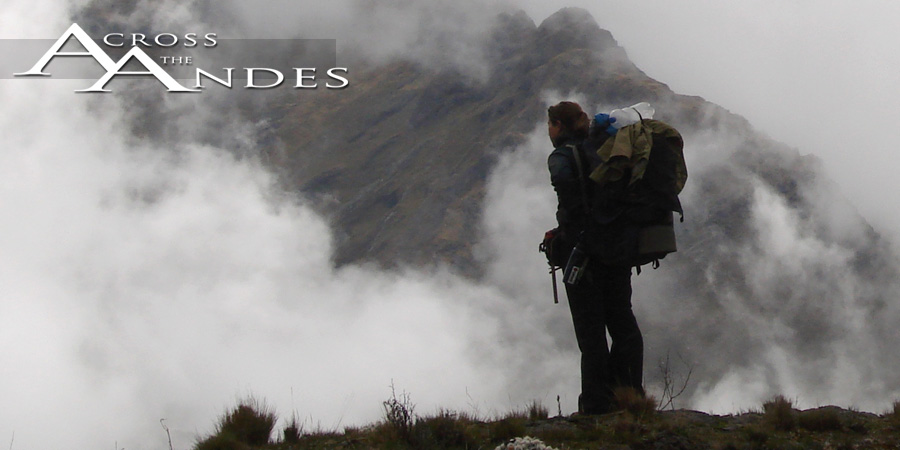The Chile Sampler
By Deia Schlosberg
March 20, 2007

The latest: we’ve been walking lots and lots of miles—our most to date, averaging between 15 and 20 a day, with many days taking us well into the 20s. Chile, as a land, as well as the Chileans who live here, are both treating us well. This past section, we had our friend Paul here to hike with us, and having fresh eyes (and ears and nose, etc.) present helped me to experience things anew again; both the amazing and the ridiculous. It’s getting to the point in the trip, it seems, where I start to lose track of what was where and when. I remember the details, it’s just that the exact order and time of them is starting to matter less. Usually I have my journal to help me out with the specifics, but for the last month or so, I haven’t been writing as much for whatever reason. It felt too forced, or maybe I was just too exhausted each night from all the walking. It’s still magnificent. And, something seems to be shifting in my mind about it all. The experience as a whole is hard to think about now in the midst of it, but I’m getting glimpses. Paul asked if we felt brainwashed by it—meaning, more or less, did it still feel like a choice to get up and walk every day, or did it just happen automatically without our decision to do so coming in anywhere. For me, I am very much aware every day of my level of desire to continue in this project. Where “level” means just that—a fluctuating scale ranging from, “Damn, I can’t wait to pick up where we left off last night, get my pack on, and see what’s around the next turn,” to, “For the love of god, just let me stay in my sleeping bag.” But because of these little glimpses I’ve been getting of the big picture, I keep acting according to the former.
Almost every human interaction we have had in the past month, outside of the towns, has been with either vineyard workers or miners. These are the two obviously largest industries in Chile, as every valley has evidence of one of the two. The workers have been entirely lovely. The industries themselves have caused us a bit of frustration, however, as both use the water from the valleys almost entirely, leaving solid blue lines on our maps representing nothing but empty river beds and some hardy shrubs. Walking through these valleys is probably the only way, other than living in one of the small towns at their bases, to see this very real impact. We had been wondering if anyone other than the goatherds and birds above was aware of the reduction in water, when we came across some signs posted all over the small town of Chihuinto protesting the mining company excavating and exploring up the road. Apparently in addition to using all of the water, the company was melting the glaciers that supplied the water as well, and the people were not pleased that they would all have to displace themselves if the situation doesn’t change. I don’t blame them. On the other side of this coin are our friends that we’ve met working for the companies, making a living to support their young kids back in the cities whom they look forward to visits with, and who are truly kind, generous and fun people. There is a market for raw materials and there is a market for fruit and wine, and so a very large percentage of Chile’s population makes its living supporting these markets, which is practically the only option available. I’m not saying that there shouldn’t be metals available for production and I’m not saying that there shouldn’t be grapes available for eating. It’s just interesting seeing the very full picture. As Gregg and I walk, we see the decline in the numbers of lizards downstream from a mine, and the grasses absent from the area upstream of the vineyards. The water that used to support these species and many others is sitting in the grapes in the supermarket down the street from you, and in the waste from the wiring of that cell phone ringing. Again, I’m not saying to stop buying grapes; grapes are not evil, and I’m not saying to stop using electronics (as I type my update on this computer here). I’m sure every food and product available in every store can be traced back to its source and shown to have similar effects, grapes probably one of the least harmful crops of all. The striking thing to me here is being able to see the whole sequence, and so, it makes me really want to have a truly informed understanding of what I choose to buy and use and consume.
All that being said, on our second night in this last chapter, after hiking up a long valley above a vineyard (where the owner, Raul, had given us handfuls of wonderful raisins to fortify us for our walk), we came upon a small community house and grounds for some of the workers. We were told we must go take a rest inside and get some water. So we did. Once there, we met yet another Raul, acting as cook, who told us we must stay for dinner because there was far too much goat meat for them to finish themselves, and we would hike much better in the morning for all the protein if offered us. So we did. It ended up being one of my favorite nights so far. We ate the best freshly baked breads as we played the guitar and sang with Raul (who has a band that covers CCR and Iron Maiden), and generally laughed a lot and enjoyed good company on a porch surrounded by lovely, tall trees, a treat in itself.
Continuing up the valley and over a few passes, I was later confronted by an etiquette question: upon meeting an older gentleman whom I want to show respect to out in the middle of the mountains, where more respect is given anyway, what is the correct action to take when he approaches me, wipes a large amount of gooey moisture from his nose/mouth area with his right hand, and then extends it to shake mine? And furthermore, pulls me in for the kiss? I opted for the post-shake hand-sani application up the trail and giving a good laugh to Gregg.

Our equally fabulous night with a small mining team of three must be mentioned as well. Soon into our next section, we found ourselves on yet another dirt road leading up to a mine. We were bummed to be on a road, but the occasional traffic became much easier to handle when we realized that every carload was stopping to inquire about our doings and then deeming us in need of whatever waters or cokes or extra bits they had in the front seat with them. Eventually we came upon a small stone dwelling with a giant, waving Colo-Colo (the universal favorite soccer team of the area) flag flying above and some orange trailers opposite it. The residents were Sergio, Sergio and Walter, a super-efficient team that welcomed us warmly into the mix for the evening, insisting we stay for tea, lentil soup, breads, a fire, and the use of one of the empty trailers for the night. We talked of international trends, news, geology, their families, jobs, and of course, moose, which despite their absence in South America, Sergio knew much about.
I haven’t written much about the difficulty of this whole undertaking in my updates because I don’t want to seem unappreciative. But I would think by now, it’s clear that I find this experience to be an enormous gift of my life and something that will, I believe, affect me positively for the rest of my life. So with that little disclaimer in there, it’s friggin’ hard! I’ve never done anything harder in my life. Mentally more than physically, though it becomes awfully grey at times, separating the two. It’s impossible to convey what it’s really like out there, and how keeping going is both the only option and the hardest thing I can imagine. If a day is without pain, I notice it. But probably the hardest part for me is only being able to connect on a real level in person with one other person consistently for almost a year now. As wonderful as that connection is, there’s something seemingly inhuman about living like that, with that void. Having another friend here for just a week makes me realize that more so. Paul has left for Patagonia, but is planning to rejoin us in a few more weeks for another round, of hiking and of sharing some deeper level of humanness with us. But along with all that I realize that I have a connection to another human, in Gregg, that would be impossible to match were it not for this experience. For that I am extremely lucky.
Paul’s week with us has been dubbed, “The Chile Sampler,” as it took us over just about every type of terrain so far encountered in this long, narrow country. We had narrow, dry valleys, 21,000 ft. peaks next to us, green, winding river beds, high, rolling passes, wide, old lake beds, huge salt flats, miners, grapes, llamas, horses, goats, stone huts; the works. I could not have picked a more representative section to introduce our friend to the country. Also representative was our perpetual struggle with finding water, which, as we’ve gone farther north, has become tougher and tougher. We decided that 24 hours at a time without water, mostly spent walking, is our limit; the sources have become too far apart and too unreliable, and the areas too remote to continue safely in the same line. Thus, we are heading east to Argentina to continue the trek to the north. The eastern slopes of the Andes are much wetter and smarter.

And so, with that we are off again. Make sure to check out the Steripen site, as well, for Gregg’s update and a piece that Paul wrote about his experience with us so far down here. Thanks for the support and the thoughts. We feel it. Much love to my family, especially.







